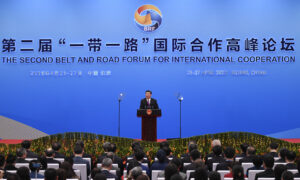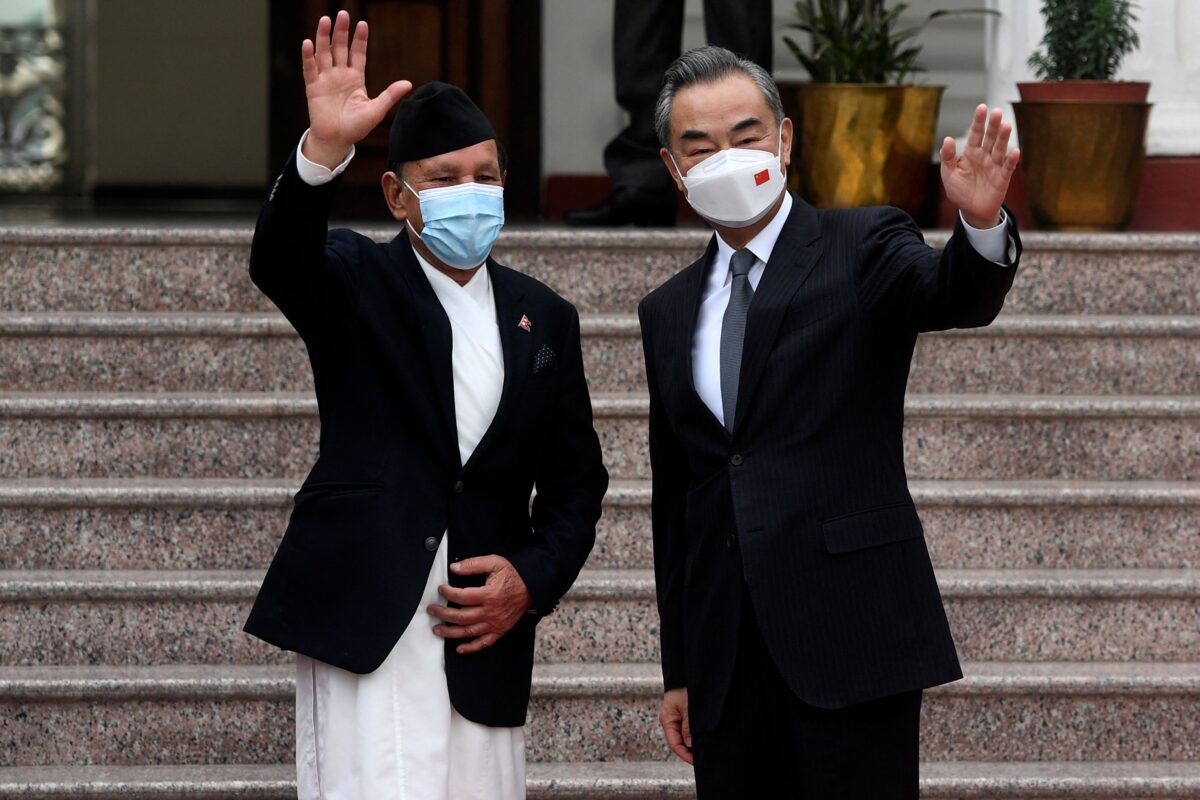China’s Latest Grift: The Global Development Initiative
CommentaryUnless you happen to live under a rock on a distant planet, you’re no doubt familiar with China’s Belt and Road Initiative (BRI), an infrastructure development strategy launched in 2013. Fast forward to 2002, and 146 of the 195 countries in the world have signed up for the risky initiative. The BRI has been a failure for broader humanity, but it has been a big win for the Chinese Communist Party (CCP). But the BRI isn’t the only CCP initiative that poses a threat to humanity. There’s also the Global Development Initiative (GDI), a shady venture that’s big on impossible promises. In September 2021, Xi Jinping, China’s dictator-in-chief, established the GDI. According to the Atlantic Council, the CCP created the initiative “to break Western hegemony over global human-rights governance.” Yes, China, a country where organ harvesting and modern-day slavery occurs, wants to oversee “human-rights governance.” Wang Yi, the Chinese minister of foreign affairs, insists that the GDI aims to establish “a global community of development” that “puts development first and the people at the center, and seeks to expedite the implementation of the 2030 Agenda.” This agenda, we’re told, will see the CCP eliminate poverty, hunger, and gender equality by the end of the decade. Considering that 200 million of its citizens still live below the poverty line and millions of Chinese women suffer physical and sexual abuse on a regular basis, the CCP has quite a mountain to climb. Worryingly, as its name suggests, the GDI is not a national agenda; it’s a global one. The CCP isn’t just trying to sell its dangerous lies to its own people; it’s trying to sell them to the world. Unfortunately, some countries are only too willing to buy them. One of those countries is Nepal. China’s Foreign Minister Wang Yi (R) and Nepal’s Foreign Minister Narayan Khadka wave before their meeting at Singhadurbar in Kathmandu, Nepal, on March 26, 2022. (Prakash Mathema/AFP via Getty Images) As The Kathmandu Post’s Anil Giri recently noted, although “not a single project under the Beijing-led Belt and Road Initiative has commenced in Nepal,” the Nepali government is only too eager to participate in the GDI. And the CCP is only too willing to “assist.” Beijing has promised to launch not one but two projects in the landlocked country. The first is called the Nepal Smiling Children Project. According to Giri, the “China Foundation for Rural Development will provide food for 3,600 children from poor communities in Kathmandu.” This sounds wonderful until you realize that the CCP never offers anything without demanding something in return. With the CCP, there’s no such thing as a free meal—literally, in this case. There’s reason to believe that Beijing is using a form of soft power to target the youth of Nepal. Perhaps, this explains the second project, which promises to offer “support” to school children outside Kathmandu, Nepal’s capital. As someone who visits Nepal regularly, I am not exaggerating when I say the following: the CCP has infiltrated this beautiful country. Beijing is actively working to destabilize Nepal’s relations with other countries, including India, its neighbor, and the United States, once a staunch ally. Sadly, the CCP is succeeding in its efforts. The GDI could be the final nail in the Nepali coffin. Rather astonishingly, China’s GDI was established a little over a year ago. Yet, as the aforementioned Wang Yi is eager to remind us, the initiative “has received the support of over 100 countries and many international organizations, including the United Nations.” In addition, more than “60 countries have joined the Group of Friends of the GDI.” Friends include Burma (commonly known as Myanmar), Iran, Cambodia, Pakistan, Thailand, at least 19 African countries, Fiji, Bolivia, and, of course, Nepal. The GDI, which calls on governments around the world to strengthen their commitment to sustainable development goals (SDGs) and the “spirit of openness and inclusiveness,” is nothing but a sham—a dangerous initiative masquerading as a decent one. After all, SDGs include climate action and the creation of peaceful societies, as well as the earlier-mentioned commitments to reducing poverty, hunger, and inequality. The CCP routinely locks up and starves its own citizens amid the COVID-19 pandemic. Moreover, China is the world’s biggest polluter. To put the country’s pollution in perspective, China emits more carbon emissions than the United States, India, and Russia combined. As other powerful countries strive to go green, China produces more coal. This is not a knock on coal, one of the most important fossil fuels. This is a knock on the CCP, a tyrannical regime that never adopts the policies that it encourages other governments to adopt (respect the environment, respect human rights, etc.) This is also a knock on the dozens of countries around the world only too willing to swallow the CCP’s unfair demands and shameless lies.

Commentary
Unless you happen to live under a rock on a distant planet, you’re no doubt familiar with China’s Belt and Road Initiative (BRI), an infrastructure development strategy launched in 2013. Fast forward to 2002, and 146 of the 195 countries in the world have signed up for the risky initiative. The BRI has been a failure for broader humanity, but it has been a big win for the Chinese Communist Party (CCP). But the BRI isn’t the only CCP initiative that poses a threat to humanity. There’s also the Global Development Initiative (GDI), a shady venture that’s big on impossible promises.
In September 2021, Xi Jinping, China’s dictator-in-chief, established the GDI. According to the Atlantic Council, the CCP created the initiative “to break Western hegemony over global human-rights governance.” Yes, China, a country where organ harvesting and modern-day slavery occurs, wants to oversee “human-rights governance.”
Wang Yi, the Chinese minister of foreign affairs, insists that the GDI aims to establish “a global community of development” that “puts development first and the people at the center, and seeks to expedite the implementation of the 2030 Agenda.” This agenda, we’re told, will see the CCP eliminate poverty, hunger, and gender equality by the end of the decade.
Considering that 200 million of its citizens still live below the poverty line and millions of Chinese women suffer physical and sexual abuse on a regular basis, the CCP has quite a mountain to climb.
Worryingly, as its name suggests, the GDI is not a national agenda; it’s a global one. The CCP isn’t just trying to sell its dangerous lies to its own people; it’s trying to sell them to the world.
Unfortunately, some countries are only too willing to buy them. One of those countries is Nepal.

As The Kathmandu Post’s Anil Giri recently noted, although “not a single project under the Beijing-led Belt and Road Initiative has commenced in Nepal,” the Nepali government is only too eager to participate in the GDI. And the CCP is only too willing to “assist.”
Beijing has promised to launch not one but two projects in the landlocked country. The first is called the Nepal Smiling Children Project. According to Giri, the “China Foundation for Rural Development will provide food for 3,600 children from poor communities in Kathmandu.” This sounds wonderful until you realize that the CCP never offers anything without demanding something in return. With the CCP, there’s no such thing as a free meal—literally, in this case. There’s reason to believe that Beijing is using a form of soft power to target the youth of Nepal. Perhaps, this explains the second project, which promises to offer “support” to school children outside Kathmandu, Nepal’s capital.
As someone who visits Nepal regularly, I am not exaggerating when I say the following: the CCP has infiltrated this beautiful country. Beijing is actively working to destabilize Nepal’s relations with other countries, including India, its neighbor, and the United States, once a staunch ally. Sadly, the CCP is succeeding in its efforts. The GDI could be the final nail in the Nepali coffin.
Rather astonishingly, China’s GDI was established a little over a year ago. Yet, as the aforementioned Wang Yi is eager to remind us, the initiative “has received the support of over 100 countries and many international organizations, including the United Nations.” In addition, more than “60 countries have joined the Group of Friends of the GDI.” Friends include Burma (commonly known as Myanmar), Iran, Cambodia, Pakistan, Thailand, at least 19 African countries, Fiji, Bolivia, and, of course, Nepal.
The GDI, which calls on governments around the world to strengthen their commitment to sustainable development goals (SDGs) and the “spirit of openness and inclusiveness,” is nothing but a sham—a dangerous initiative masquerading as a decent one. After all, SDGs include climate action and the creation of peaceful societies, as well as the earlier-mentioned commitments to reducing poverty, hunger, and inequality. The CCP routinely locks up and starves its own citizens amid the COVID-19 pandemic.
Moreover, China is the world’s biggest polluter. To put the country’s pollution in perspective, China emits more carbon emissions than the United States, India, and Russia combined. As other powerful countries strive to go green, China produces more coal. This is not a knock on coal, one of the most important fossil fuels. This is a knock on the CCP, a tyrannical regime that never adopts the policies that it encourages other governments to adopt (respect the environment, respect human rights, etc.) This is also a knock on the dozens of countries around the world only too willing to swallow the CCP’s unfair demands and shameless lies.
Views expressed in this article are the opinions of the author and do not necessarily reflect the views of The Epoch Times.












